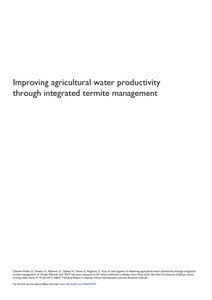Resource information
Termite infestation is symptomatic of severe land degradation in many semi-arid regions of the Nile Basin. One characteristic of land degradation is low organic matter (OM) reserves in vegetative biomass and soil. One consequence is excessive rainwater depletion through non-productive evaporation and runoff leading to low agricultural water productivity and diminished livelihoods. CPWF research demonstrated that rapid restoration of pasture production is possible by providing manure through night corralling of cattle prior to re-seeding termite affected rangeland in Uganda. In degraded Ethiopian and Ugandan croplands, preliminary results also suggest that application of maize or sorghum stover to growing maize crops reduces termite damage and associate yield losses. Termites appear to prefer feeding on litter, manure and stover rather than on living plant material. We hypothesize that sustainable crop and livestock production requires a minimum threshold of available dry-season ‘litter’ to avoid termite-driven destruction. We propose an integrated termite management (ITM) approach that involves establishment of sufficient OM reserves to sustain termites and other ecosystems services. One anticipated consequence is enabling termites to resume their beneficial roles in promoting nutrient recycling, infiltration and aeration of soil. In this context, ITM requires an appropriate mix of relevant bio-physical and socio-economic interventions. Besides providing water for animal and crop production, the process of rebuilding OM reserves on degraded termite affected rainfed agricultural land requires additional water. We anticipate that the long-term results of increasing OM reserves will be higher agricultural water productivity, increased crop and animal production and improved livelihoods.



